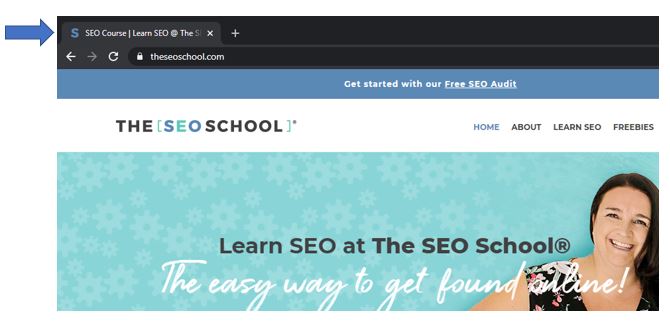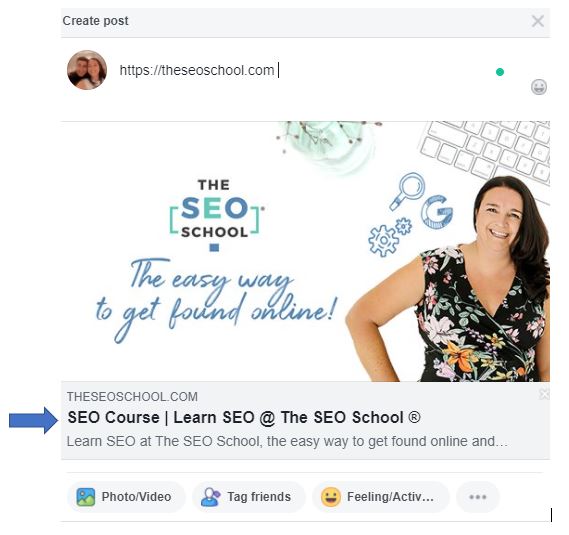SEO Mini-Course
Get Started On Your SEO Journey


Meta tags are often overlooked, but can be very valuable to both your SEO and clickthrough rate from organic search (the Google search results page) when done right.
The two main types of meta tags that are considered most important to SEO are the Title Tag and Meta Name Descriptions and these are hidden in the source code of every page on your website. Find out what they are, why they are so important, and why you need to start using them here.
Title tags are incredibly important for your website SEO. They are the title of your website page as seen in the Google search results, they help Google determine which searches to show your pages for, and they also grab the attention of your target audience.
Every one of your website pages should have its own unique title tag featuring the keywords you are specifically targeting for that page. The length is approximately 50-60 characters, any more and you run the risk of Google cutting your title tag short. This isn’t always a tragedy, sometimes it’s completely valid to squeeze in one more keyword to appeal to Google’s algorithm and accept that the end of your title will be lopped off.
We recommend that your title tag takes the form of:
Keyword Phrase | Keyword Phrase | Business Name
There are three places that the title tag appears.



When writing up your tags, take the time to make a unique one for each page specific to that page’s keyword focus. The idea is to make it as easy as possible for Google to see that your page is relevant to the search and rank you higher for it.
For admin type pages such as disclaimers, copyright, and privacy policy pages, just a basic title tag will do. You don’t really need to optimise these pages as it is very unlikely people will be searching for them and you don’t really want your customers clicking on the disclaimer page as their first impression of your website. Keep it simple, for example:
Disclaimers | Business name
Meta descriptions are the mini paragraphs under your title tag in the google search results. They only exist in the source code of your website so you won’t find them anywhere on your page. Aside from on Google, they also show up on social media posts. They have nothing to do with how highly your site is ranked but everything to do with converting potential customers and convincing them to click through to your page.

To write successful meta descriptions, try to include a keyword and a unique selling point to let searchers know exactly what the page will show them, convincing them to click. Remember to keep it short – Meta descriptions can be any length, but Google generally truncates them to ~155–160 characters. It’s best to keep meta descriptions long enough that they’re sufficiently descriptive, so we recommend descriptions between 50–160 characters. Keep in mind that the “optimal” length will vary depending on the situation, and your primary goal should be to provide value and drive clicks. Write a unique meta description for each page, and keep in mind that Google may use it and may not, but it is good practice to have them just in case.
By properly utilising SEO title tags and meta descriptions, you are giving Google users the best possible first impression of your business. The title tag has the added benefit of doing wonders for your SEO, so using meta-data well is a sure-fire way to improve your ranking and conversion rate.
Check out my new online, self-managed course, The SEO School, which takes you through all the key tools and techniques of a successful SEO strategy. The course is great for business owners, website managers and anyone who wants hands-on learning about all the essentials of SEO from an industry expert. Find out more about The SEO School here.
FREE Community
Are you frustrated customers can’t find your website?
Join my FREE online community for SEO tips!
seo Freebies
Are you the best kept secret on the internet?
It’s time to change all that with my DIY SEO freebies!
The SEO Course
Do you have a website that’s not performing? Learn SEO and put your website to work!
We talk about how technology and digital communications have literally put the whole world at our fingertips, but the reality is that we still love local. And that’s why we have to love local when it comes to SEO. Why does local SEO matter? Local SEO is important because the days of relying on a Yellow Pages
AI is on everyone’s lips. All the talk is about what AI can do and what it is going to be able to do. Some people even have it taking over the whole world, sending humans into a life of servitude to machines and computer systems. Should we fear the future? If you’re a content creator, here’s some good news. This
It’s no secret that SEO requires a multi-pronged approach in order to be effective. Some elements are simple and easy to implement while others require more technical expertise, but each one plays a role in great SEO. This article covers one of the most important elements of SEO…backlinks. Backlinks are links to
Then join my Facebook community…

If you’re looking for a supportive online group that share the same mission – to get found online – then this community is for you!
From SEO updates and tips to Ask Me Anything Fridays, this is your space to pick-my-brains.
